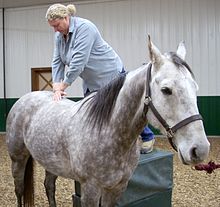
Veterinary chiropractic, also known as animal chiropractic, is chiropractic for animals – a type of spinal manipulation.[1] Veterinary chiropractors typically treat horses, racing greyhounds, and pets.[2] Veterinary chiropractic is a controversial method due to a lack of evidence as to the efficacy of chiropractic methods.[3] Contrary to traditional medicine, chiropractic therapies are alternative medicine.[4] There is some degree of risk associated with even skilled manipulation in animals as the potential for injury exists with any technique used.[5] The founder of chiropractic, Daniel David Palmer, used the method on animals, partly to challenge claims that the placebo effect was responsible for favorable results in humans.[6] Chiropractic treatment of large animals dates back to the early 1900s.[7] As of 2019[update], many states in the US provide statutory or regulatory guidelines for the practice of chiropractic and related treatments on animals, generally requiring some form of veterinary involvement.[8]
- ^ Haussler, KK (2010). "The role of manual therapies in equine pain management". Vet Clin North Am Equine Pract. 26 (3): 579–601. doi:10.1016/j.cveq.2010.07.006. PMID 21056301.
- ^ Kayne, Steven (2004). Veterinary Pharmacy. Pharmaceutical Press. p. 143. ISBN 0-85369-534-2. Retrieved April 22, 2008.
- ^ Daniel Kamen (2001). "Politics and technique". Dyn Chiropr. 19 (13).
- ^ Taylor, L L; Romano, L (1999). "Veterinary chiropractic". The Canadian Veterinary Journal. 40 (10): 732–735. ISSN 0008-5286. PMC 1539824. PMID 10572672.
- ^ Cite error: The named reference
Ramey2000was invoked but never defined (see the help page). - ^ Kuchinski, Kristine (2012). Pediatrics of common and uncommon species. Philadelphia, Pa.: Saunders. pp. 286–287. ISBN 9781455744466.
- ^ "Complementary and alternative veterinary medicine—such as acupuncture, herbs and chiropractic—becoming more mainstream" (Press release). American Veterinary Medical Association. July 14, 2007. Archived from the original on May 20, 2008. Retrieved May 30, 2008.
- ^ "Scope of Practice: Complementary and alternative veterinary medicine (CAVM) and other practice act exemptions". American Veterinary Medical Association. May 2019. Retrieved March 22, 2016.
© MMXXIII Rich X Search. We shall prevail. All rights reserved. Rich X Search
